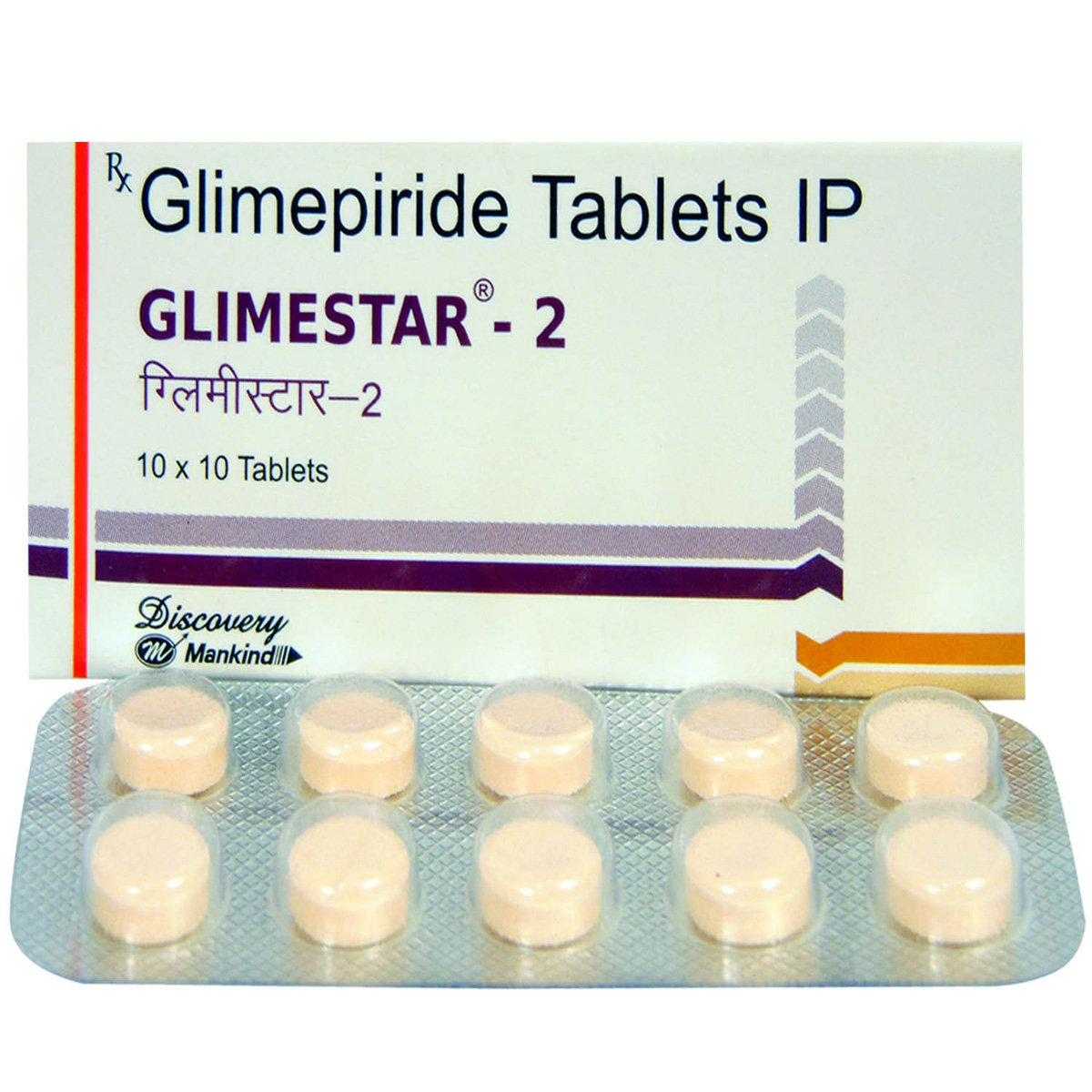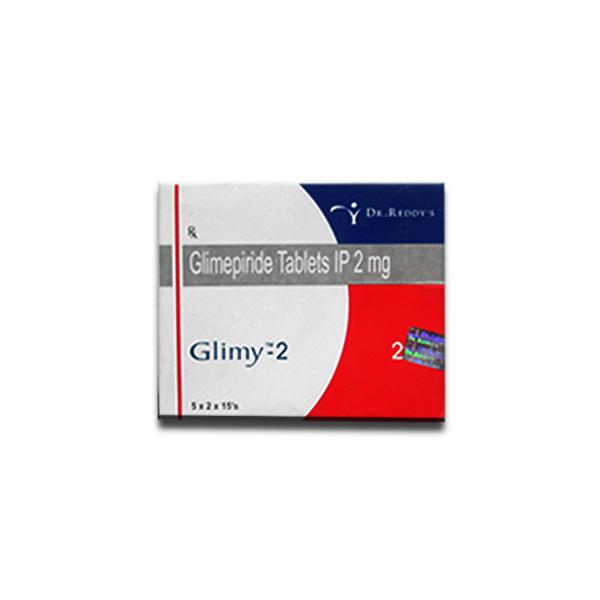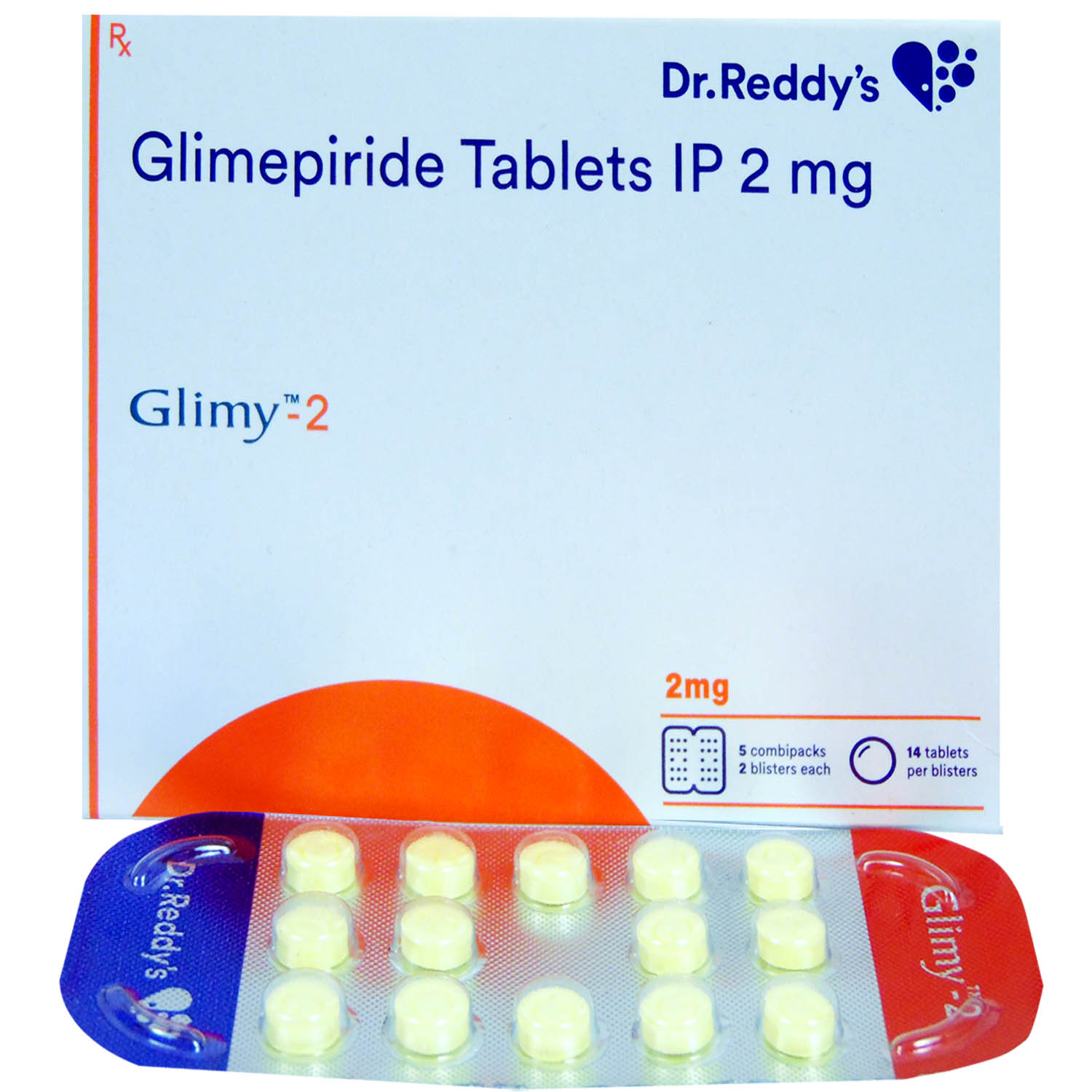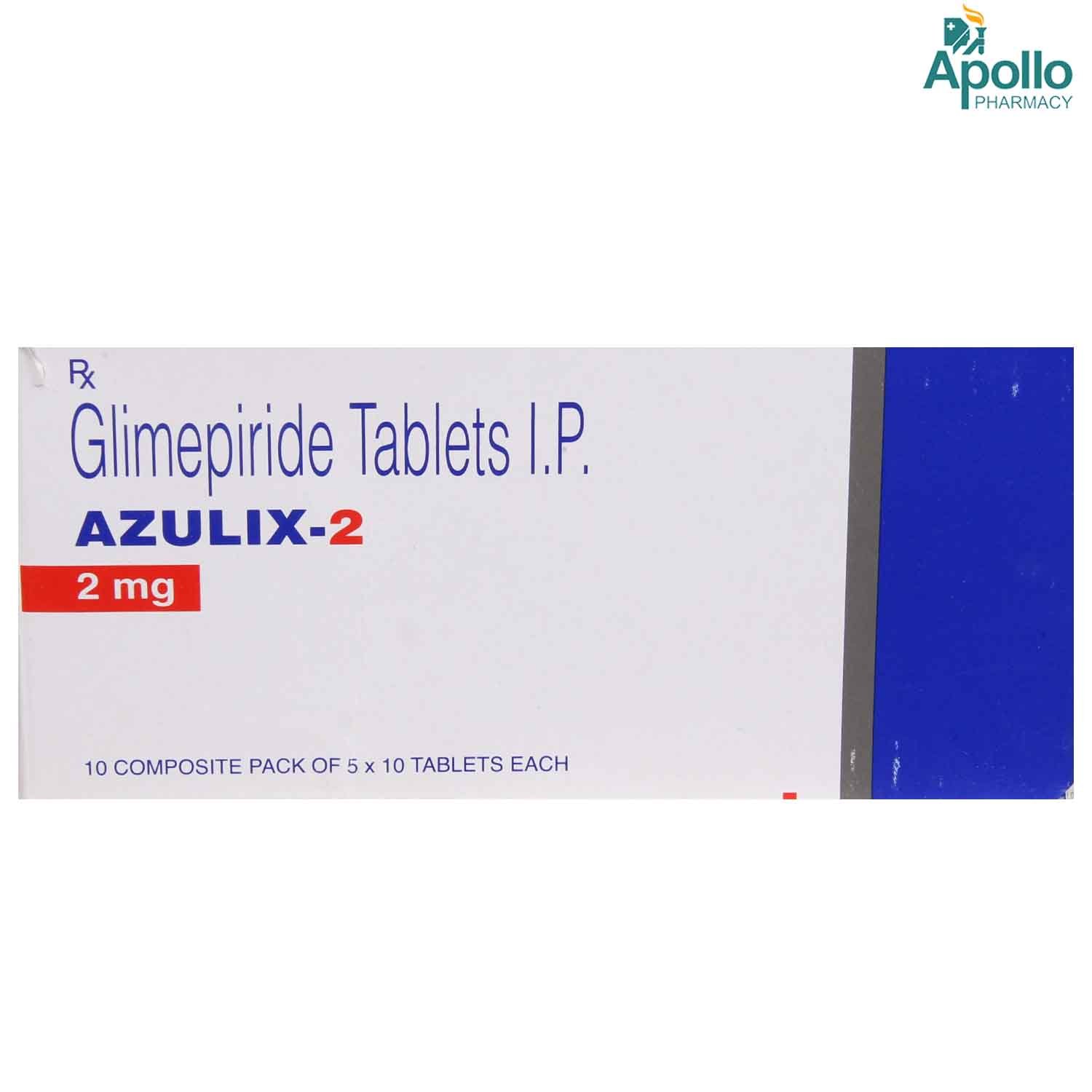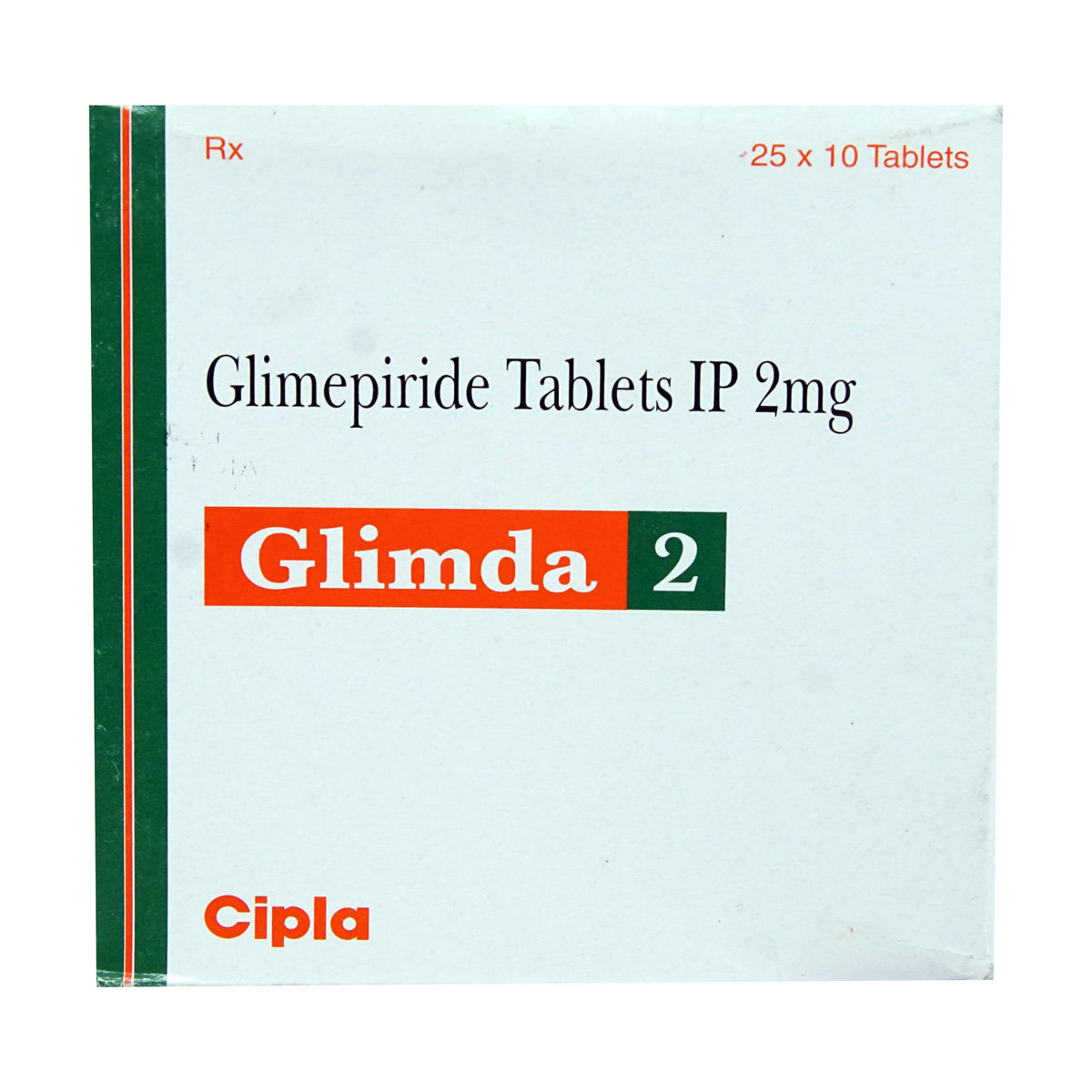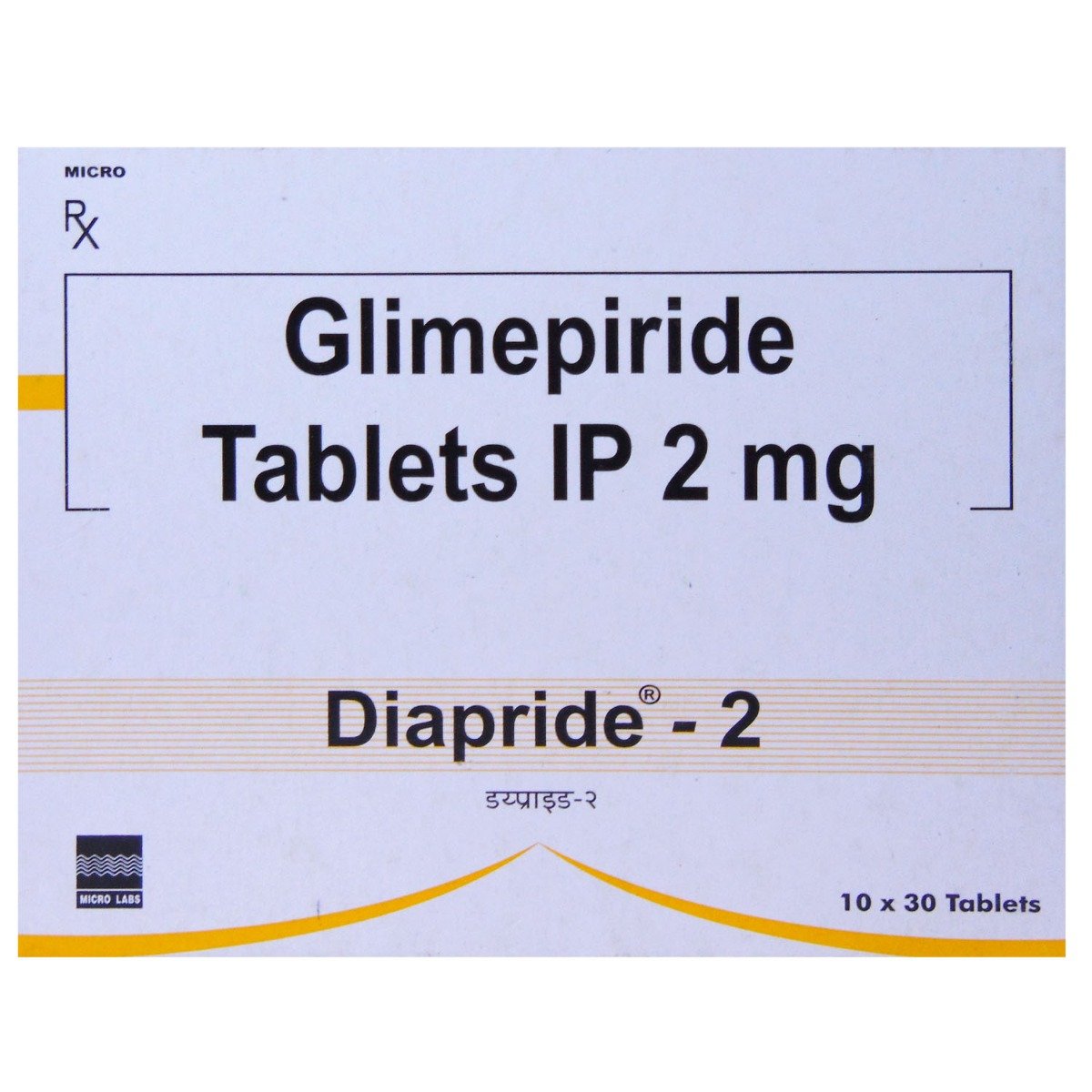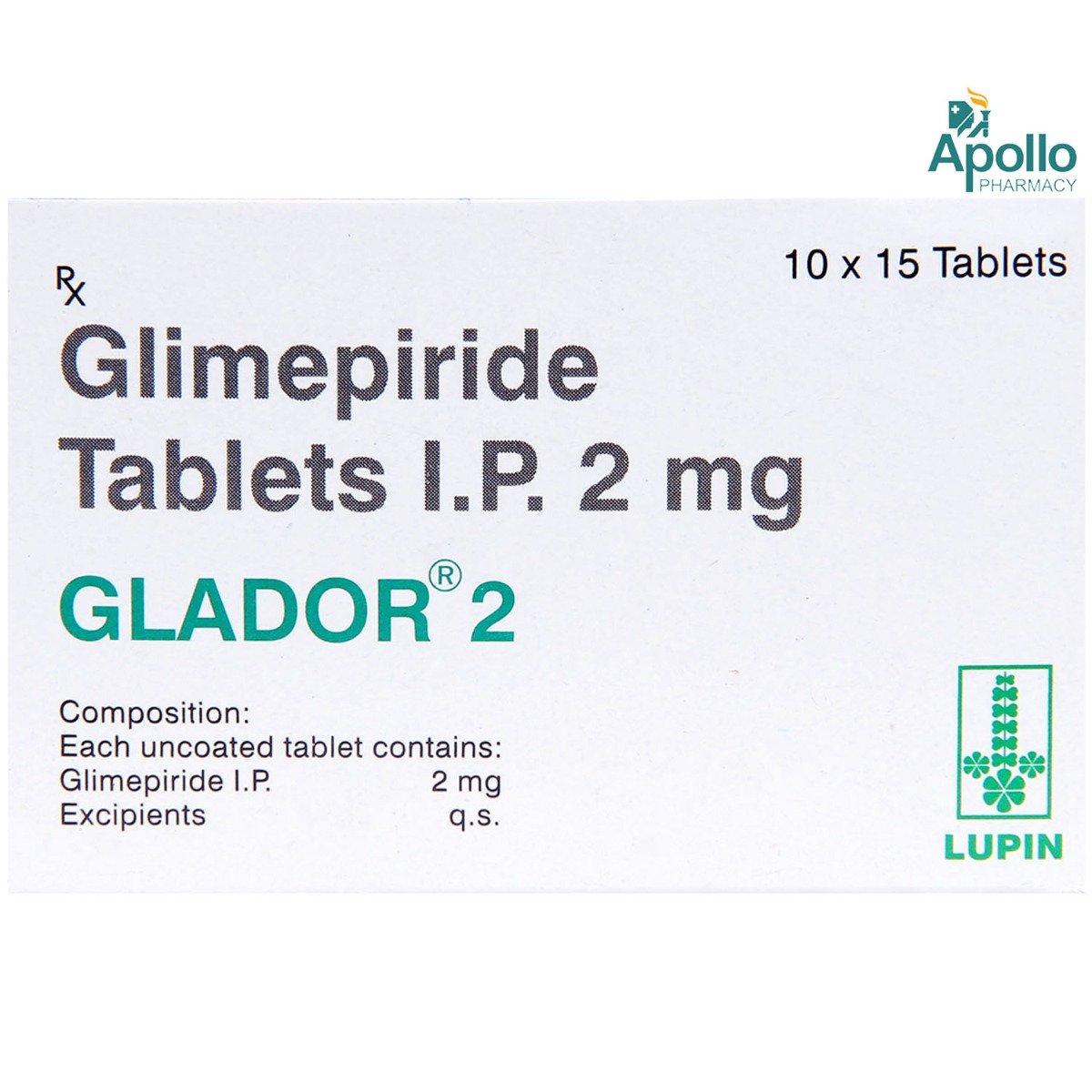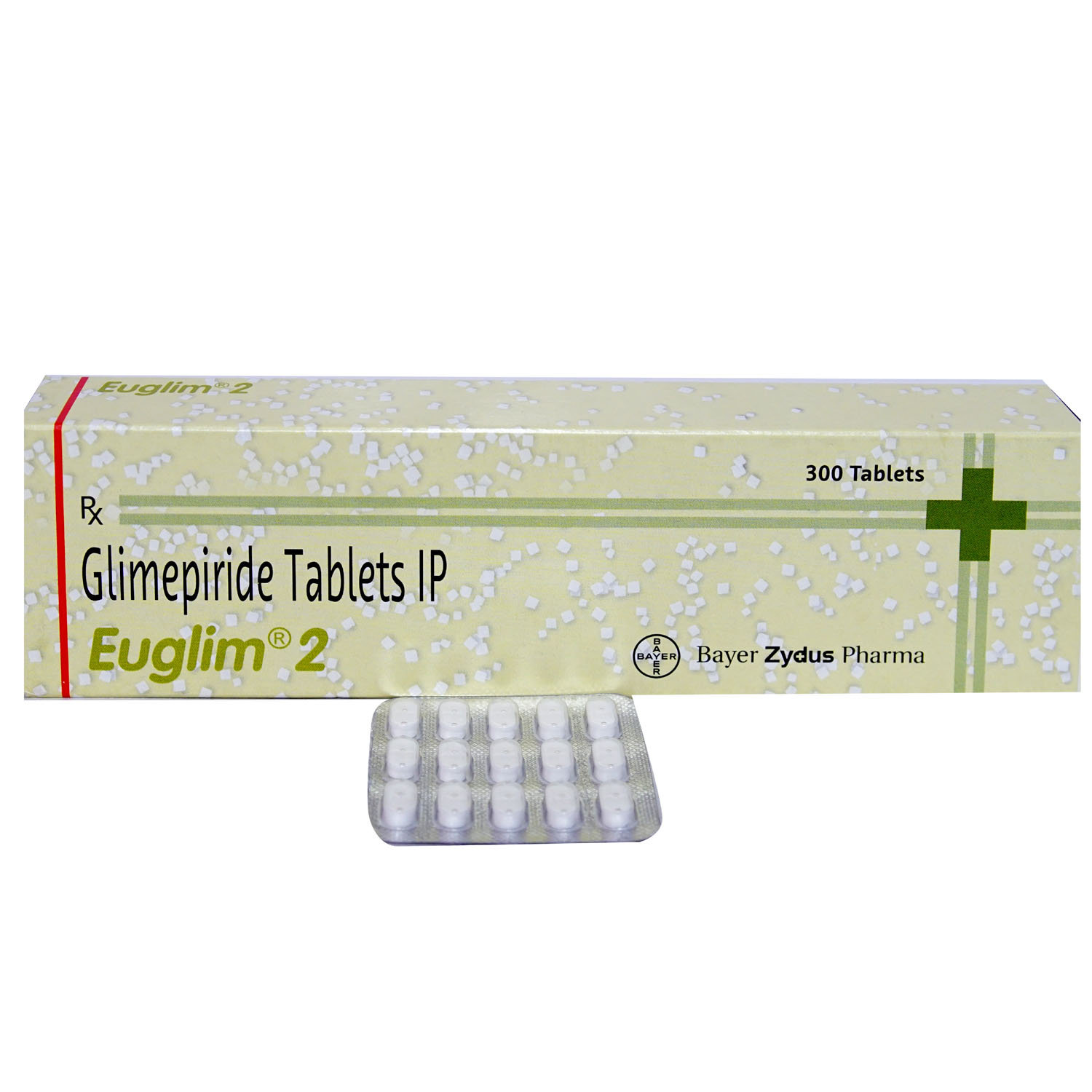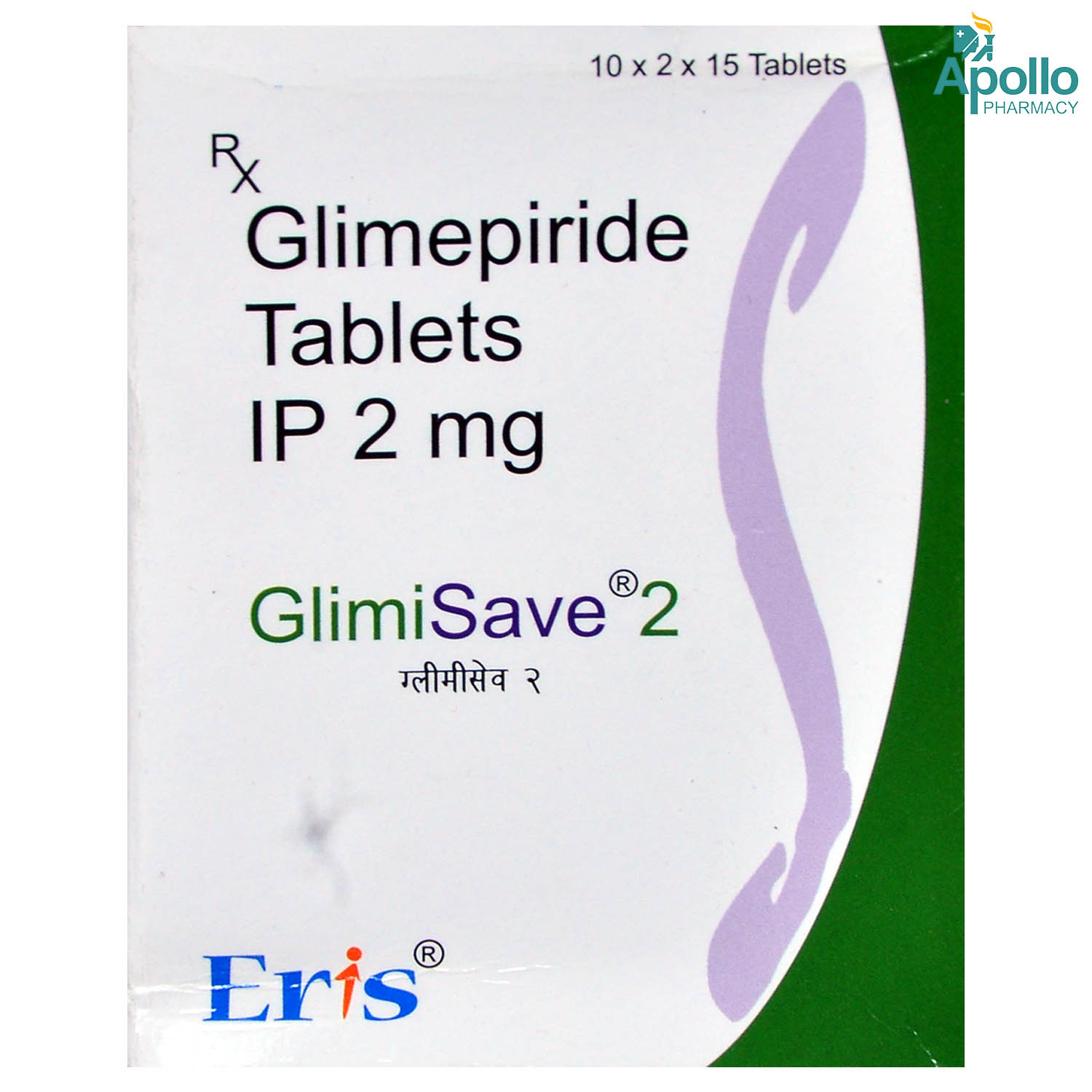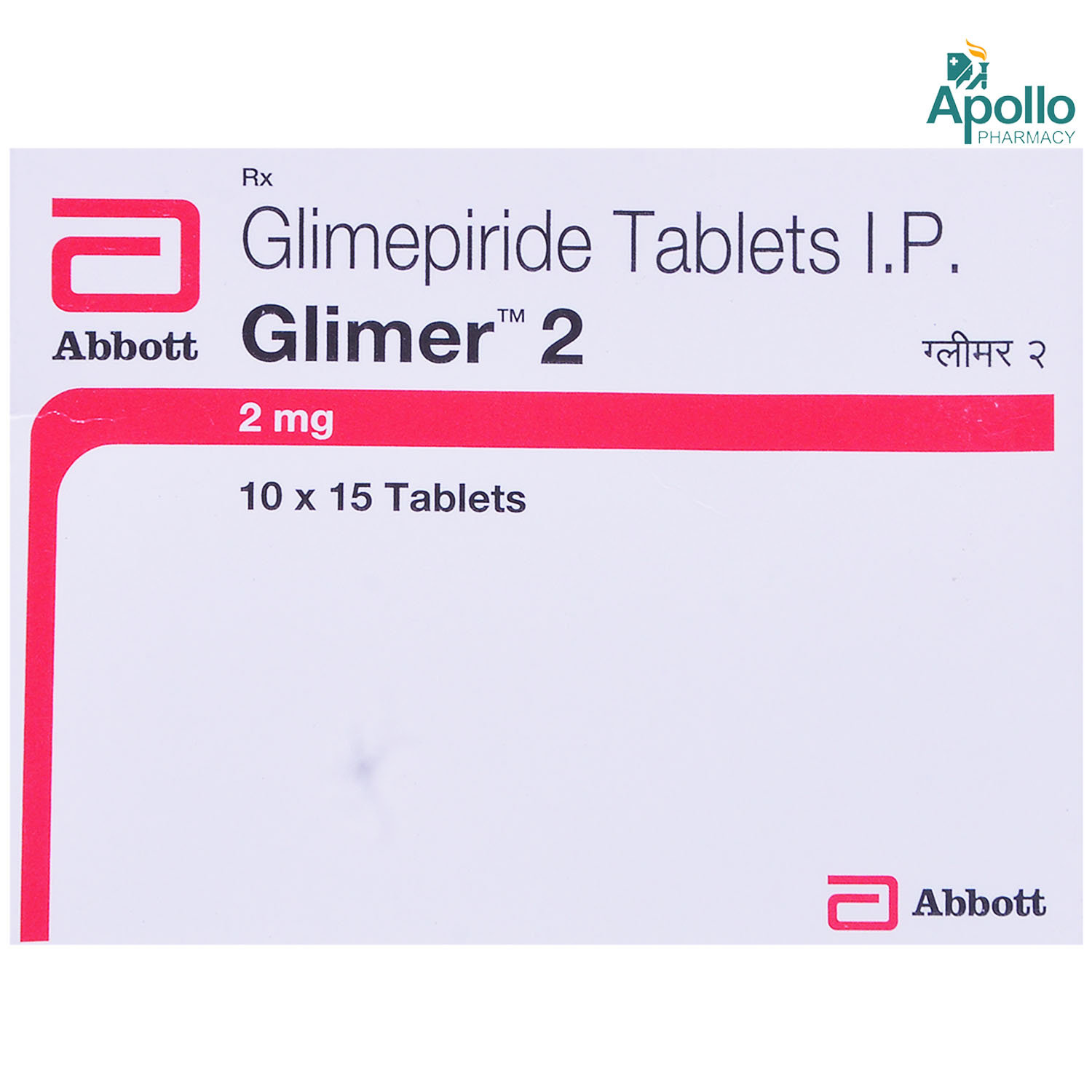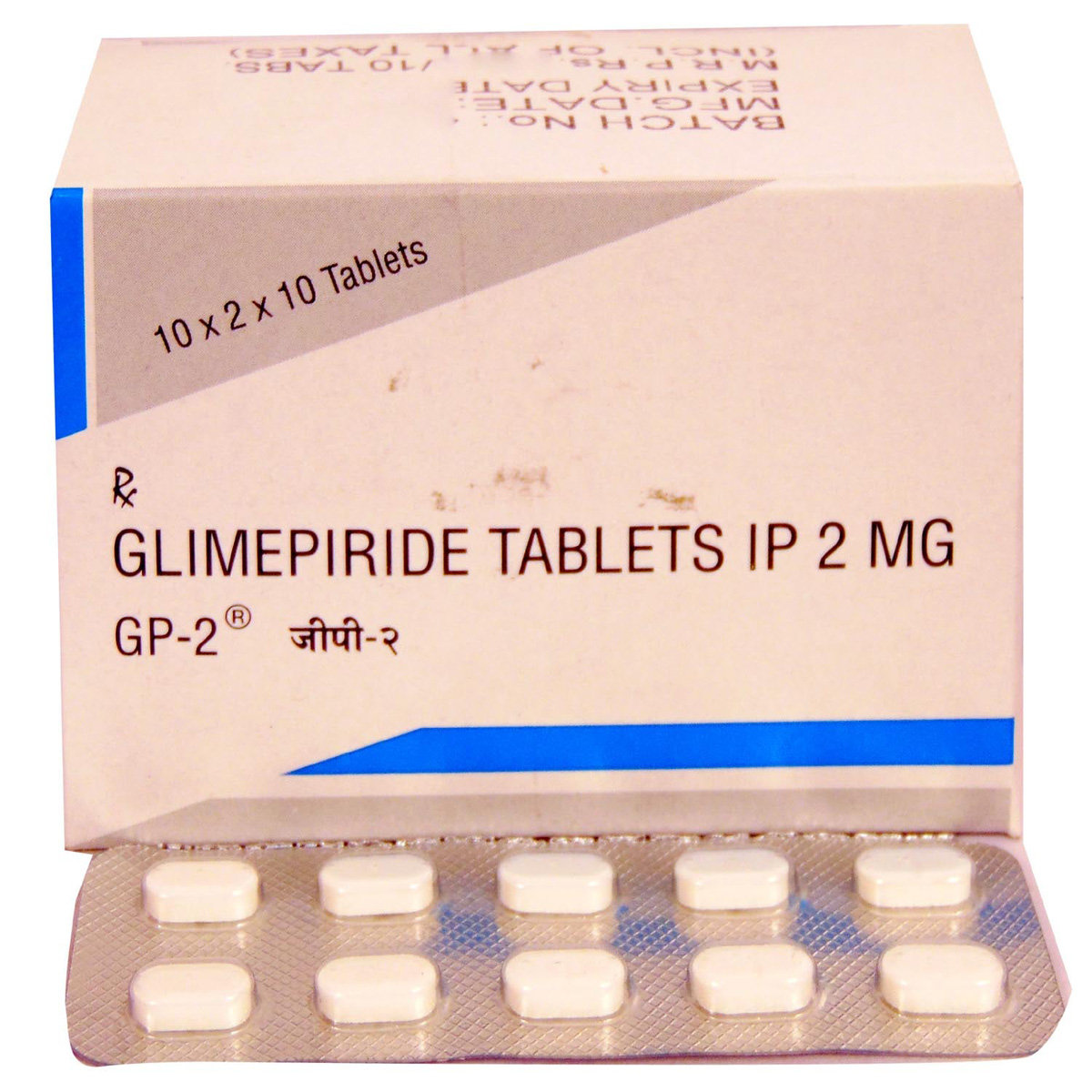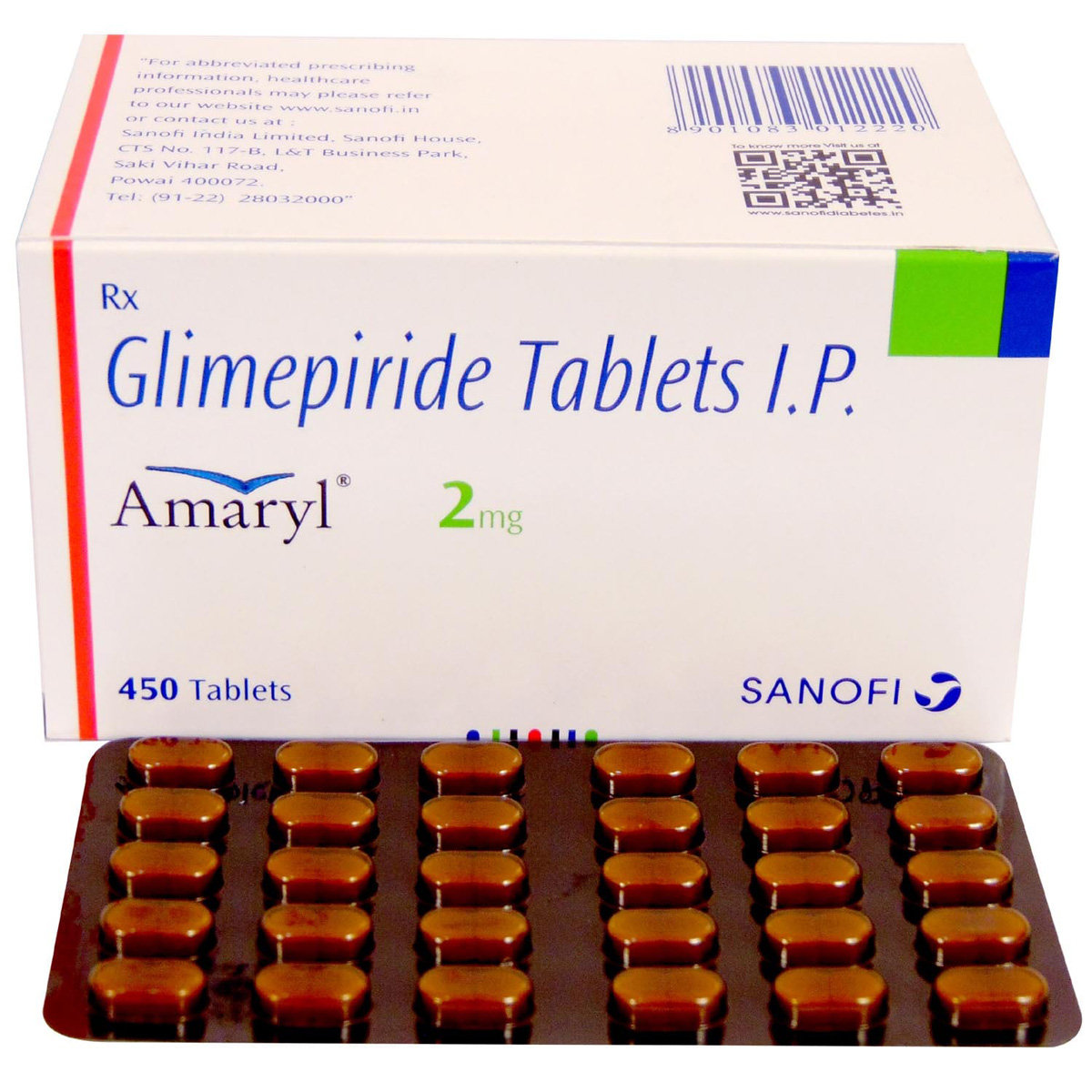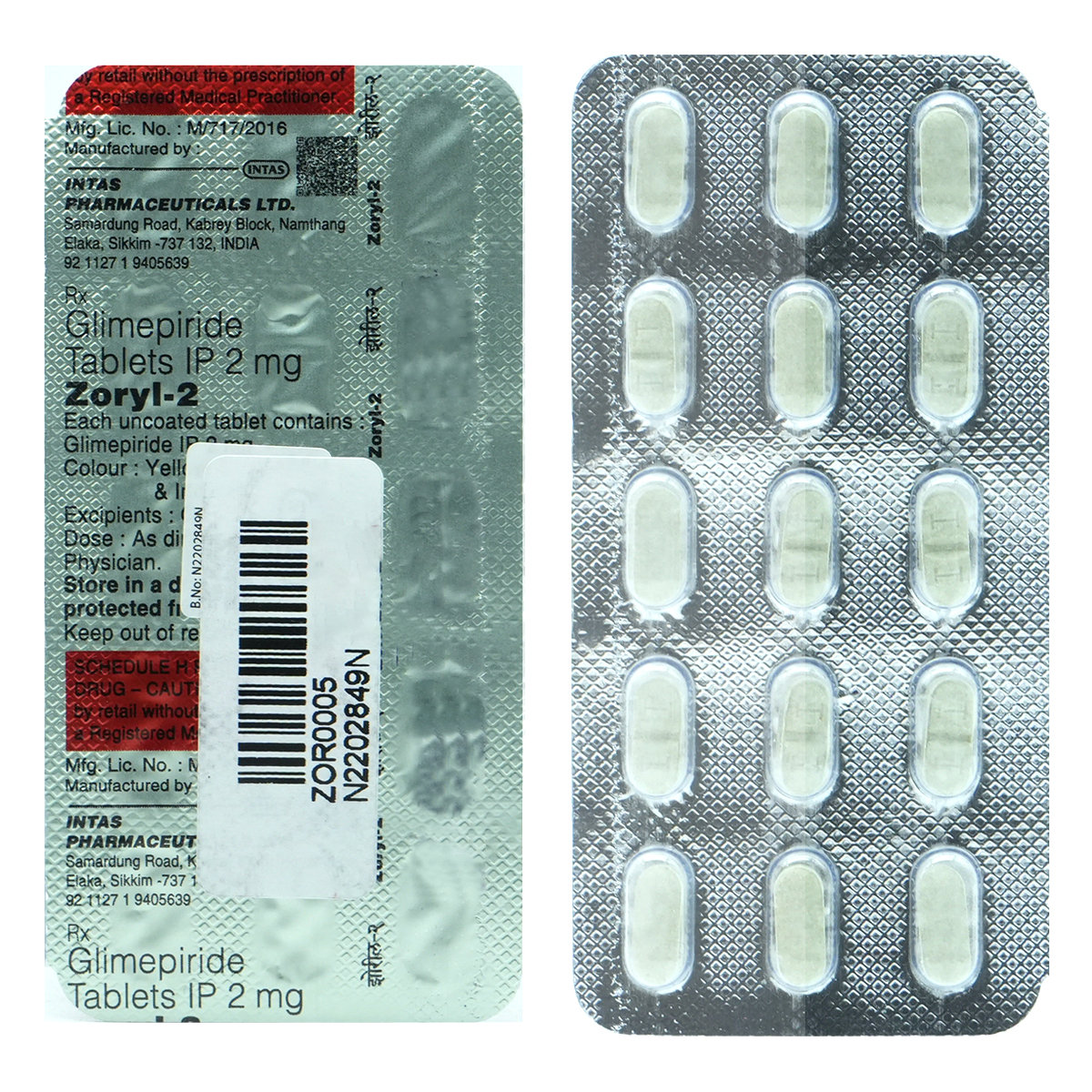GMP-2 Tablet 10's
MRP ₹60.5
(Inclusive of all Taxes)
₹9.1 Cashback (15%)
Provide Delivery Location
Online payment accepted
 Prescription drug
Prescription drugWhats That
Composition :
Manufacturer/Marketer :
Consume Type :
Expires on or after :
Return Policy :
About GMP-2 Tablet
GMP-2 Tablet belongs to a class of antidiabetic called 'sulfonylureas' used to lower raised blood sugar levels in Type 2 diabetes mellitus (non-insulin-dependent diabetes mellitus - NIDDM). Type 2 diabetes develops if the body does not produce enough insulin or when your body's insulin does not work as well as it should. Insulin is a substance that helps to lower the level of sugar in your blood, especially after meals.
The GMP-2 Tablet contains Glimepiride which acts on insulin-secreting cells called beta cells inside the pancreas and activates calcium channels on cells which lets insulin pass out of the cell. This insulin then makes each cell in the body take up glucose and utilize it, thus lowering raised blood glucose. Therefore, it prevents symptoms of type 2 diabetes.
Take GMP-2 Tablet as prescribed by your doctor. Some people may experience an allergic reaction (skin rash, hives & sensitivity to sun rays), liver dysfunction (jaundice, bile duct blockage, and hepatitis), seizures, coma & low glucose levels. Most of these side effects of GMP-2 Tablet do not require medical attention and gradually resolve over time. However, if the side effects persist or worsen, please consult your doctor.
GMP-2 Tablet should not be stopped even if you feel better without consulting your doctor as the sugar level keeps changing. If you stop taking GMP-2 Tablet abruptly, it may increase your sugar levels which could further increase the risk of eyesight loss (retinopathy), kidney (nephropathy) and nerve damage (neuropathy). GMP-2 Tablet should not be taken if you have type 1 diabetes mellitus or severe kidney or liver disease. Please inform your doctor if you have any heart disease or plan to get pregnant or breastfeed.
Uses of GMP-2 Tablet
Directions for Use
Key Benefits
GMP-2 Tablet is used in people with type 2 diabetes to minimize elevated blood sugar levels with a balanced diet and exercise in combination. GMP-2 Tablet can be combined with insulin or other forms of oral antidiabetic medication. GMP-2 Tablet decreases blood sugar levels in a diabetic patient by increasing the production and secretion of insulin from the pancreas beta cells. Thus, it helps in controlling increased blood sugar levels after the meal.
Storage
- If you experience low blood sugar levels, inform your doctor. They will assess the severity and make recommendations for the next actions.
- Your doctor will assess your symptoms, blood sugar levels, and overall health before recommending the best course of action, which may include treatment, lifestyle modifications, or prescription adjustments.
- Follow your doctor's instructions carefully to manage the episode and adjust your treatment plan.
- Make medication adjustments as recommended by your doctor to prevent future episodes.
- Implement diet and lifestyle modifications as your doctor advises to manage low blood sugar levels.
- Monitor your blood sugar levels closely for patterns and changes.
- Track your progress by recording your blood sugar levels, food intake, and physical activity.
- Seek further guidance from your doctor if symptoms persist or worsen so that your treatment plan can be revised.
- Reduce salt intake to minimize fluid buildup.
- Use compression stockings, sleeves, or gloves.
- Gently massage the affected area towards the heart.
- Protect the swollen area from injury and keep it clean.
- Use lotion or cream to keep the skin moisturized.
- Inform your doctor about the nausea and discuss possible alternatives to the medication or adjustments to the dosage.
- Divide your daily food intake into smaller, more frequent meals to reduce nausea.
- Opt for bland, easily digestible foods like crackers, toast, plain rice, bananas, and applesauce.
- Avoid certain foods that can trigger nausea, such as fatty, greasy, spicy, and smelly foods.
- Drink plenty of fluids, such as water, clear broth, or electrolyte-rich beverages like coconut water or sports drinks.
- Use ginger (tea, ale, or candies) to help relieve nausea.
- Get adequate rest and also avoid strenuous activities that can worsen nausea.
- Talk to your doctor about taking anti-nausea medication if your nausea is severe.
- Record when your nausea occurs, what triggers it, and what provides relief to help you identify patterns and manage your symptoms more effectively.
- Preventing Vomiting (Before it Happens)
- Take medication exactly as prescribed by your doctor. This can help minimize side effects, including vomiting.
- Having a small meal before taking your medication can help reduce nausea and vomiting.
- Talk to your doctor about taking anti-nausea medication along with your prescribed medication.
- Managing Vomiting (If it Happens)
- Try taking ginger in the form of tea, ale, or candy to help alleviate nausea and vomiting.
- What to Do if Vomiting Persists
- Consult your doctor if vomiting continues or worsens, consult the doctor for guidance on adjusting your medication or additional treatment.
- Inform Your Doctor: Notify your doctor immediately about your diarrhoea symptoms. This allows them to adjust your medication or provide guidance on managing side effects.
- Stay Hydrated: Drink plenty of fluids to replace lost water and electrolytes. Choose water, clear broth, and electrolyte-rich drinks. Avoid carbonated or caffeinated beverages to effectively rehydrate your body.
- Follow a Bland Diet: Eat easy-to-digest foods to help firm up your stool and settle your stomach. Try incorporating bananas, rice, applesauce, toast, plain crackers, and boiled vegetables into your diet.
- Avoid Trigger Foods: Steer clear of foods that can worsen diarrhoea, such as spicy, fatty, or greasy foods, high-fibre foods, and dairy products (especially if you're lactose intolerant).
- Practice Good Hygiene: Maintain good hygiene to prevent the spread of infection. To stay healthy, wash your hands frequently, clean and disinfect surfaces regularly, and avoid exchanging personal belongings with others.
- Take Anti-Diarrheal Medications: If your doctor advises, anti-diarrheal medications such as loperamide might help manage diarrhoea symptoms. Always follow your doctor's directions.
- Keep track of your diarrhoea symptoms. If they don't get better or worse or are accompanied by severe stomach pain, blood, or dehydration signs (like extreme thirst or dark urine), seek medical help.
Drug Warnings
Before taking GMP-2 Tablet , inform your doctor if you are healing from injury, had or going to have surgery, have fever infections or other sources of stress, then contact your doctor as it might be appropriate to adjust care temporarily. If you have a serious kidney/liver disease, breastfeeding or pregnant, consult the doctor before using GMP-2 Tablet . Do not take GMP-2 Tablet if you are allergic to sulpha drugs, glimepiride, or any other antidiabetic medicines or have a deficiency of glucose 6-phosphate dehydrogenase (G6PD). A heart disease patient should consult a doctor before taking the GMP-2 Tablet as it may worsen the heart disease's current conditions. Do not take GMP-2 Tablet with oral contraceptives as it may increase blood sugar levels. On the other hand, taking GMP-2 Tablet with pain killers like aspirin or ibuprofen can lower your blood sugar.
Drug-Drug Interactions
Drug-Drug Interactions
Login/Sign Up
Co-administration of GMP-2 Tablet and Iodamide can increase the risk of lactic acidosis (when the body produces too much lactic acid).
How to manage the interaction:
Taking GMP-2 Tablet with Iodamide is generally avoided as it can result in an interaction, please consult your doctor before taking it.
Co-administration of GMP-2 Tablet and Iobenzamic acid can increase the risk of lactic acidosis (when the body produces too much lactic acid).
How to manage the interaction:
Taking GMP-2 Tablet with Iobenzamic acid is generally avoided as it can result in an interaction, please consult your doctor before taking it.
Co-administration of GMP-2 Tablet with Metrizamide together can cause the risk of lactic acidosis (when the body produces too much lactic acid ).
How to manage the interaction:
Taking GMP-2 Tablet with Metrizamide is generally avoided as it can possibly result in an interaction, it can be taken if a doctor has advised it. However, if you experience headaches, muscle cramps or pain, contact a doctor immediately. Do not discontinue any medications without consulting a doctor.
Co-administration of Iopydol with GMP-2 Tablet can increase the risk of side effects.
How to manage the interaction:
Taking GMP-2 Tablet with Iopydol is not recommended, please consult your doctor before taking it.
Co-administration of GMP-2 Tablet and Iocarmic acid can increase the risk of lactic acidosis (when the body produces too much lactic acid).
How to manage the interaction:
Taking GMP-2 Tablet with Iocarmic acid is generally avoided as it can result in an interaction. please consult your doctor before taking it.
Co-administration of Iodixanol with GMP-2 Tablet can increase the risk of side effects.
How to manage the interaction:
Taking GMP-2 Tablet with Iodixanol is not recommended, please consult a doctor before taking it. Do not discontinue the medications without consulting a doctor.
Co-administration of GMP-2 Tablet and Iobitridol can increase the risk of lactic acidosis (when the body produces too much lactic acid).
How to manage the interaction:
Taking GMP-2 Tablet with Iobitridol is generally avoided as it can result in an interaction. Please consult your doctor before taking it.
Co-administration of Ioversol with GMP-2 Tablet can increase the risk of side effects.
How to manage the interaction:
Taking GMP-2 Tablet with Ioversol is not recommended, please consult your doctor before taking it.
Co-administration of Iopamidol with GMP-2 Tablet can increase the risk of side effects.
How to manage the interaction:
Taking GMP-2 Tablet with Iopamidol is not recommended, please consult a doctor before taking it. Do not discontinue the medications without consulting a doctor.
Co-administration of Iotroxic acid with GMP-2 Tablet can increase the risk of side effects.
How to manage the interaction:
Taking GMP-2 Tablet with Iotroxic acid is not recommended, please consult your doctor before taking it.
Drug-Food Interactions
Drug-Food Interactions
Login/Sign Up
Diet & Lifestyle Advise
- Do regular exercise such as cycling, walking, jogging, dancing or swimming for a minimum of 30 minutes per day. Invest at least 150 minutes of your week in exercise.
- Maintain healthy body weight as obesity is also related to the onset of diabetes.
- Maintain a low fat and a low sugar diet. Replace carbohydrates containing foods with whole grains, fruits and vegetables as carbohydrates turn to sugars leading to high blood sugar.
- Avoid consumption of alcohol and quit smoking.
Side Effects of GMP-2 Tablet
- Allergic reactions
- Headache
- Nausea
- Blood pressure drop
- Shock
- Abnormal liver function
- Including skin and eye yellowing (jaundice)
- Bile flow issues (cholestasis)
- Liver inflammation (hepatitis) or failure of the liver
Habit Forming
Therapeutic Class
All Substitutes & Brand Comparisons
RX
Glimestar 2 Tablet 10's
Mankind Pharma Pvt Ltd
₹39.5
(₹3.56 per unit)
34% CHEAPERRX
Auglimy 2 Tablet 10's
Auspharma Pvt Ltd
₹53
(₹5.3 per unit)
2% CHEAPERRX
Glimy 2 Tablet 15's
Dr Reddy's Laboratories Ltd
₹92.5
(₹5.43 per unit)
Author Details
We provide you with authentic, trustworthy and relevant information
Drug-Diseases Interactions
Drug-Diseases Interactions
Login/Sign Up
FAQs
Drug-Drug Interactions Checker List
- ASPIRIN
- ROSUVASTATIN
- DULOXETINE
- DAPAGLIFLOZIN
- GLYBURIDE
- INSULIN
- CANAGLIFLOZIN
- SITAGLIPTIN
- EMPAGLIFLOZIN
- FUROSEMIDE
- ATORVASTATIN
- PREGABALIN
- METFORMIN
- NAPROXEN
- CLOPIDOGREL
- IBUPROFEN
- WARFARIN
Disease/Condition Glossary
Type 2 diabetes: It is a chronic (long-lasting) condition that keeps the body from properly utilizing insulin. Hence, people affected with type 2 diabetes either do not produce enough insulin, or there is resistance to the action of insulin. Middle-aged or older are most likely to suffer from type 2 diabetes, so it is also known as adult-onset diabetes. Symptoms of type 2 diabetes include increased thirst, frequent urination at night, slow wound healing, increased hunger, fatigue, and blurred vision. In some cases, there may be weight gain while in rare cases weight loss may be observed. The complication of type 2 diabetes also includes nerve problems, kidney problems, the damaged retina of eyes or blindness, loss of limbs, sexual dysfunction, and an increased chance of heart attack or stroke.

Have a query?
Alcohol
Safe if prescribed
Not recommended to take GMP-2 Tablet with alcohol. Alcohol intake may increase or decrease the blood sugar lowering action of GMP-2 Tablet in an unpredictable way resulting in a harmful event.
Pregnancy
Consult your doctor
GMP-2 Tablet is a pregnancy Category C medicine which means that there are no well-controlled studies that have been done in pregnant women. However, if you are taking GMP-2 Tablet during pregnancy, stop taking it at least 2 weeks before your due date or as prescribed by your doctor.
Breast Feeding
Consult your doctor
Not recommended to be taken by breastfeeding mothers. GMP-2 Tablet may pass into breast milk and may cause the risk of low blood sugar in the infant. Consult your doctor for further advice.
Driving
Safe if prescribed
Not recommended in patients with fluctuating glucose levels. GMP-2 Tablet can reduce the ability to concentrate or react, if your blood sugar is lowered (hypoglycemia) or raised (hyperglycemia) or if you develop visual problems as a result of such conditions. Thus not recommended as the patient can endanger himself or others (e.g. when driving a car or using machines).
Liver
Consult your doctor
Not recommended in patients with liver dysfunction. A patient should consult a doctor before taking GMP-2 Tablet as it may cause liver damage.
Kidney
Consult your doctor
Not recommended in patients with kidney dysfunction. A patient should consult a doctor before taking GMP-2 Tablet as it may cause kidney damage.
Children
Safe if prescribed
GMP-2 Tablet is not approved for use by a person less than 18 years old.
Recommended for a 30-day course: 3 Strips




